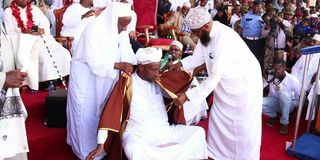Murule clan’s powerful leader whose word is final

Sultan Mohamed Khalif, the traditional leader of the Murule clan in Mandera during his inauguration on October 15, 2016.
What you need to know:
- For a candidate to be considered for this position, one must be deeply religious, wealthy and a family man with no criminal record.
- The candidate must also be aged 40 years and above, must be conversant with all aspects of the culture, traditions and Islamic ethos.
On October 15, 2016, Mr Mohamed Khalif had his social status elevated after he was inaugurated as the supreme traditional leader of the Murule/Weytan clan in Mandera County.
The process had taken the community more than three months, including the selection, negotiations and interviewing stages of possible candidates for the position.
The holder of this position wields power and his word, after deliberations with his “cabinet”, is always final.
Religious leaders, the business community, clan elders and other professionals led the process of selecting the supreme leader.
“We felt we needed a leader who could guide our community in every issue and that is how we ended up selecting Sultan Khalif,” said Mr Abdille Billow, an elder.
For a candidate to be considered for this position, one must be deeply religious, wealthy and a family man with no criminal record.
The candidate must also be aged 40 years and above, must be conversant with all aspects of the culture, traditions and Islamic ethos.
“Such a leader should be loving and caring and all that came out in Sultan Khalif among more than five other candidates,” said Mr Billow.
Sultan Khalif is a successful farmer and a prominent businessman.
In an exclusive interview with the Nation, Sultan Khalif said that since his inauguration in 2016, he has led the Murule clan in finding peace with neighbouring clans.
A sultan among the Murule clan must not necessarily possess formal education but should be knowledgeable in Islamic teachings and hadiths.
Settling disputes
His roles include being the community spokesperson, ensuring discipline and order in the Council of Elders and delivering rulings in disputes in the community.
Sultan Khalif says he has managed to bring peaceful existence between the clans in Mandera through negotiations.
His leadership qualities were recently put to the test in a conflict between the Murule (his clan) and the Garre clan over the disputed Yedho village.
The two clans reached an agreement after week-long negotiations in July as both claimed ownership of the village along the borderline of the two clans.
“My work as the clan leader is cultivating a good relationship between neighbouring clans, the government and my own clan,” he said.
“Every clan in this county and elsewhere must have a leader who is responsible for the direction that the clan takes in every matter,” he said.
Together with his council members from each sub-clan, Sultan Khalif says he has been able to arbitrate fairly.
The council of elders, headed by the Sultan, has 20 other members whose responsibility is to unify the community.
The council gives guidance on social and political issues and also sets the agenda for the community.

Sultan Mohamed Khalif, the traditional leader of the Murule clan in Mandera during his inauguration on October 15, 2016.
“We hear and resolve disputes within and outside the Murule community,” said Sultan Khalif.
The council remains the focal point for all activities within the community.
In politics, Sultan Khalif and his council members vet candidates and present the best to the people. He however acknowledges that it is common for some people to hold divergent views with the council on such matters.
“Deciding good political leaders for our community is part of our job because we want competent leaders and not just anybody running for elections. We want leaders who care about the community and not their own selfish interests,” he said.
He said the council of elders fairly and equitably distributes political seats to different sub-clans of the larger Murule clan.
Unlimited term of office
“We negotiate with other communities over sharing of political seats and other senior positions within the county and national government,” he said.
The council also has powers to discipline, punish and fine any community member or sub-clan that disrespects its decision.
Sultan Khalif and his council are life leaders of the Murule clan, meaning that their terms of office are unlimited.
“We are in office forever, unless one resigns or dies, in which case the clan chooses the next leader,” he said.
The supreme traditional leader’s position is not hereditary and, in case of death or resignation, the clan selects the next leader through negotiations.

Sultan Mohamed Khalif, the traditional leader of the Murule clan in Mandera during his inauguration on October 15, 2016.
“None of my children will inherit this position from me, unless the clan decides to pick one of them,” he said.
Sultan Khalif remains the sole leader of the Murule clan all over the world and rules from Mandera.
Sultan Khalif served as Mandera Town Council Chairman between 1996 and 1999 and he is the holder of Head of State Commendation (HSC) award.
Sultan Mohamed Haji Gababa of the Garre clan and the Degodia community leader Wabar Abdille Abdi both reside in Ethiopia.
This leadership is pegged on the Islamic religious tenet which prohibits women from being members of the council.





